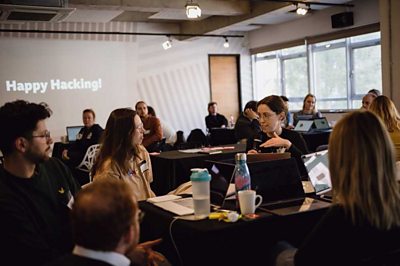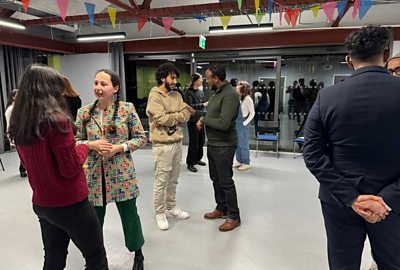This was the year of generative AI. In News Labs we were experimenting with it before ChatGPT caught the world’s attention. With projects like Tell Me More, we had already combined GPT3.5 with information from relevant BBC articles to create short explanations of key terms within articles, and in 2023 we trialled this with audiences to find out if it helped them better understand stories. With all the game-changing tools now available, we want to make sure we’re ahead of the curve, and keeping audiences at the heart of what we do.
In April, we ran our first newsHACK since the pandemic. Teams from across Europe considered if we could use generative AI to address the reasons people choose not to engage with news. We wanted to test those ideas — so we developed safe, sandboxed environments to explore how generative AI can support, augment and improve how our journalists work; where definitively not to use it; and how to safeguard against risk. It’s meant we can work faster and get results to inform the thinking of our colleagues in engineering, editorial, strategy and policy.

It’s also been a year when our long experience with multilingual technologies came into its own. The BBC’s breadth of content — publishing in 42 languages ranging from Afaan Oromo to Yoruba — means we can bring a unique lens to what it means to connect across cultures, and the rapid developments in large language models (LLMs) are unlocking exciting new capabilities for newsroom collaboration.
As well as this experimentation, a huge focus for us has been understanding and responding to the evolving impact of synthetic media on the spread of disinformation. Working with the growing C2PA industry standard and the BBC’s own Verify team, we talked to audiences to ask them how and why they trusted the images they see. From there we piloted a way for journalists to cryptographically-sign images they have journalistically verified so we can be as clear as possible about where an image has originated and if generative AI was involved in that process.
While it might sound like AI took up all of our attention, we also found time to develop tooling for BBC Verify to better find and fact-check sources on Telegram, and pilot our Live Highlights tool on Eurovision, Wimbledon, Prime Minister’s Questions and Glastonbury.

And we’ve always got our eyes on the big picture. Audiences are changing and journalism must change, too. Building on our experiments in modular and hyper-local journalism with the SALCO 2023 project, we launched the News for All programme, a two-year collaborative partnership with Media Cymru and communities in South Wales in a project using design justice principles. We want to learn from those who don’t get value from our journalism right now and work with them to devise new ways of writing and presenting stories which will better speak to all our audiences and better meet their information needs.

Looking forward, 2024 is going to be the year of the election. From India to Indonesia, USA to UK, more than 70 elections will be taking place in 40 countries around the world. Alongside our editorial colleagues, we’ll be developing ways of working with our audiences to better create content that’s meaningful and helps them navigate the messages they see and hear.
We’ll continue showing our audiences how we work and how we verify and trust the work of others that we publish on our platforms using provenance signals. And we’re planning trials across our World Service desks to amplify our journalism, regardless of the language it’s written in.
But generative AI isn’t going anywhere. Next year will be all about helping prepare our audiences and the BBC for what’s ahead, and how to navigate the new technologies that are influencing the information landscape. We’ll be alive to the impact it will have to the wider news ecosystem and we’ll be talking to public service news providers around the world to discuss how we should be responding to it on behalf of our audiences.
We can’t wait to begin.
Latest news
Read all newsBBC News Labs
-

News
Insights into our latest projects and ways of working -

Projects
We explore how new tools and formats affect how news is found and reported -

About
About BBC News Labs and how you can get involved -

Follow us on X
Formerly known as Twitter




